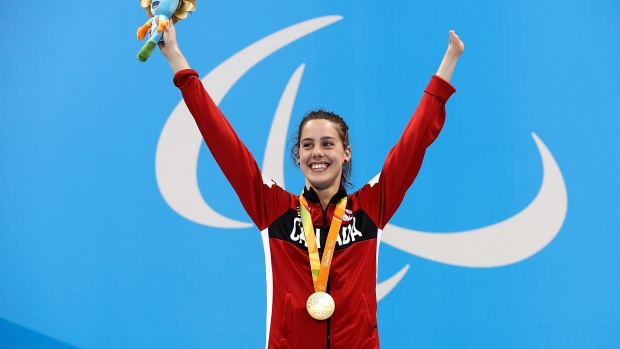Sep 18, 2016
Swim star Aurelie named Canada's flag-bearer for closing ceremony
Swim star Aurelie Rivard was chosen to carry Canada's flag in the closing ceremonies of the Rio Paralympics. The 20-year-old from Saint-Jean-sur-Richelieu, Que., captured three gold medals in Rio, and set two world records.
The Canadian Press

RIO DE JANEIRO — Aurelie Rivard is young and talented and loaded with promise.
And the triple gold medallist in swimming is the perfect representation, said Chantal Petitclerc, of Canada's rebuilding team that reached its goal of a top-16 finish at the Rio Paralympics.
Rivard, a 20-year-old from Saint-Jean-sur-Richelieu, was chosen to carry Canada's flag into Maracana Stadium for Sunday's closing ceremonies of the Rio Paralympics, capping what will go down as a successful Games for both Canada and host Brazil.
"She represents what we're trying to say here," said Petitclerc, Canada's chef de mission. "This team is rebuilding. This team has a lot of young potential like Aurelie, who made it happen here."
Canada finished 14th in the total medals table, with eight gold, 10 silver and 11 bronze. The 29 medals were two less than the team won four years ago in London, but Petitclerc said the numbers reflect the fact that countries are catching Canada — once a front-runner — in Paralympic sport.
"The 29 medals means that the Games are tough," Petitclerc said. "I think Paralympic athletes take great pride in knowing that they have to work so much harder than 20 years ago to get those Paralympic medals.
"I wished for 32 (medals), but I'm really happy to see that the level of competition is so tough."
China led all nations with 239 medals, followed by Britain with 147 and Ukraine with 117.
Canada shone in the pool, on the track and on the road. Rivard led an eight-medal performance in swimming, Canada's track and field team, led by Michelle Stilwell and Brent Lakatos, roared to eight medals. And cycling won nine medals.
The young Rivard followed in the footsteps of Penny Oleksiak, the 16-year-old upstart who became a household name last month when she won four swimming medals, earning her the honour of flag-bearer in the closing ceremonies.
"It's such an honour," said Rivard, who set two world records on the week, and also won a silver medal. "I couldn't think of a better way to end this dream week for me.
"I know I've worked for everything I got this week. And if it means I'm going to be the next leader of the team, I'm happy to have the position. . . I don't need to step up on a table and speak, or give orders or advice, I think just by my actions it's going to be enough."
Canada's highly-touted wheelchair rugby team lost a 52-50 heartbreaker to Japan on Sunday morning to finish a heart-breaking fourth.
"It's something we're not going to forget about any time soon," said the team's 22-year-old star Zak Madell. "I think the whole team's got to keep this in the back of our mind, and prepare for whatever comes next."
Petitclerc said their result points again to the growing depth in Paralympics.
"There was a time when wheelchair rugby was Canada and the U.S., and maybe Australia. Now you have to fight your way through every single game."
Japan had never won a wheelchair rugby medal. Canada's women's and men's wheelchair basketball teams also missed the podium — the first time both teams have come up empty-handed in 28 years.
To Petitclerc, these Games were as much about the message than the medals. She talked about a happy incident at Olympic Stadium on Saturday. Two young Brazilian boys approached her and her longtime Australian rival Louise Sauvage and asked for a race.
"So we're racing in corridors with those two Brazilian kids," said Petitclerc, who won 14 Paralympic gold medals over her illustrious track career. "I thought 'This is pretty amazing. They don't care about my disability. They don't care about my accident. They just want to know if they can be faster than me.'
"This young crowd, I think it's important for every sport that there's kids in the stadiums, but when it comes to Paralympic sport, it's even more important, because it goes beyond being active," she added. "It's the best way to tell someone a person with a difference, it's no big deal. It de-dramatizes everything. And to me, it's amazing."
Brazil, though, came up perhaps the biggest winner. Mired by disappointing ticket sales, there was fear no one would turn up to watch. But Brazilians got on board quickly and showed out in droves, many crowds rivalling those seen at the Olympics a month earlier.
"I've had the best experience of my life, Brazilians are so nice, they're so supportive, and actually we had more people in the stands at the pool than at the Olympics," Rivard said. "They were there every single night, and what I loved is that whether there were any Brazilians in the race or not, they were cheering."
Ticket sales topped two million earlier this week, making it the second-most attended Games in Paralympic history behind London in 2012. A campaign called #FilltheSeats, meant to help schoolchildren and disabled people attend the Games, helped. Prince Harry and the band Coldplay were among those who contributed.
The one pall cast over the Games was the death of Iranian cyclist Bahman Golbarnezhad. Golbarnezhad died after a horrific crash in the road race, becoming the first Paralympian to die in competition.
A moment of silence was planned for Sunday night's opening ceremonies.
Note to readers: This is a corrected story. An earlier version reported that Canada finished 13th.
